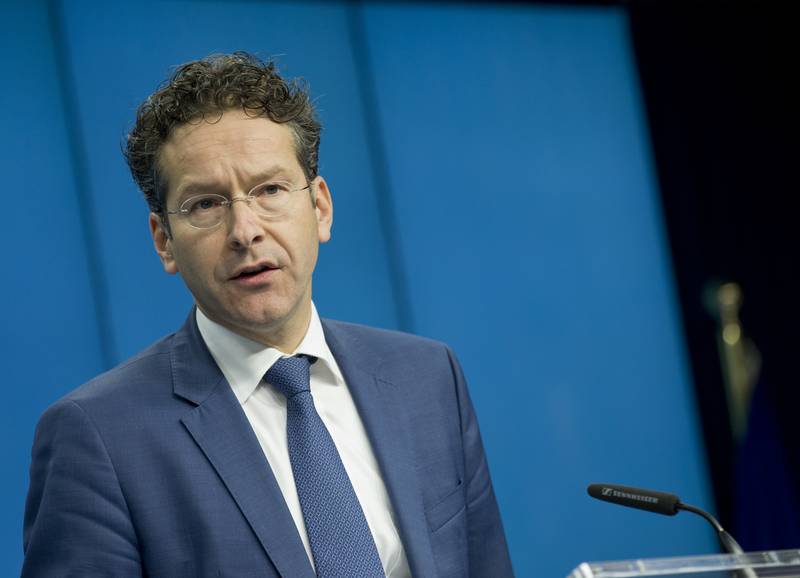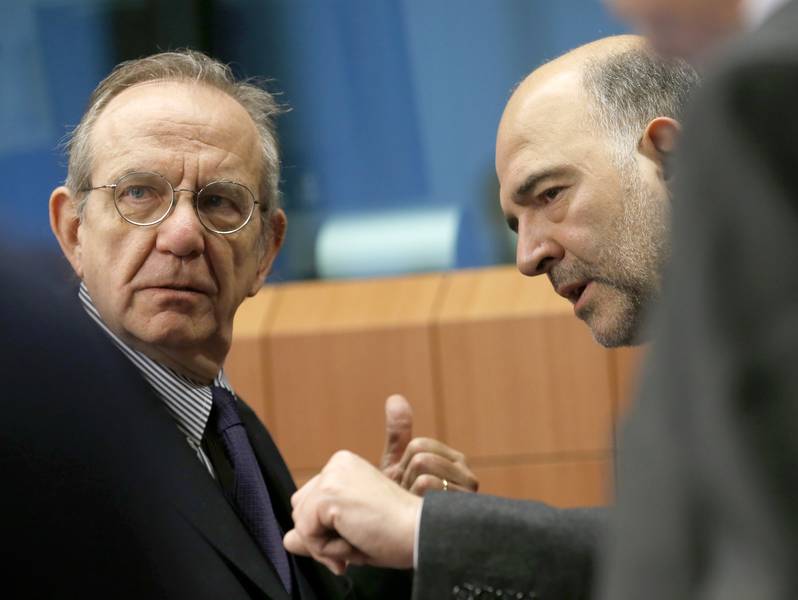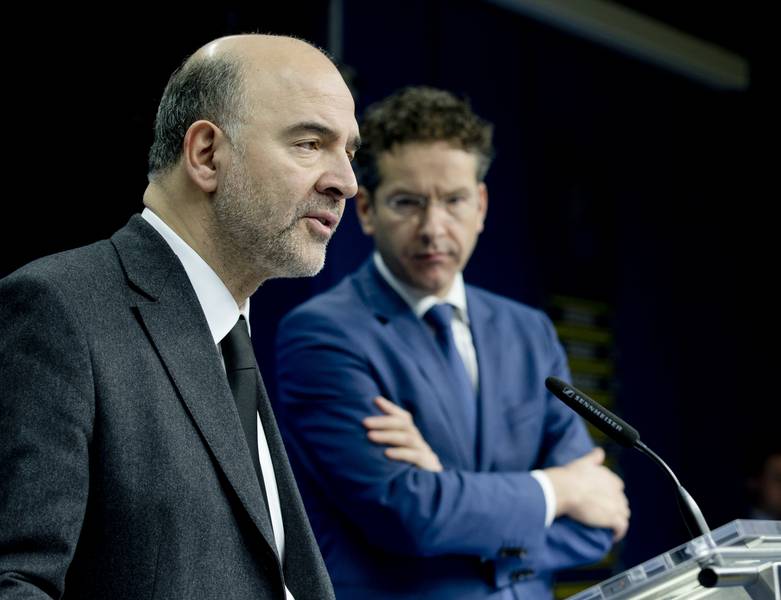Eurosceptics Threaten the Survival of the Stability and Growth Pact
Adelina Marini, December 12, 2014
 Even before the criteria for application of the much awaited in the EU flexibility of the fiscal rules are published, it is clear that one of them will be the political environment. Hardly this criterion will be articulated officially, but it is being discussed openly in the EU. The issue took much of the time of the last for this year meeting of the Eurogroup during the discussion of the European Commission's analyses of the member states' budgetary plans and Greece's desire for an extension of its second bailout programme. The two issues are directly related and are very important at a time when there is a risk of discrediting of the fiscal rules, agreed in response to the financial markets' pressure after the euro area debt crisis broke out. While there are no significant problems in applying the reformed economic governance for all the 28 member states - the six-pack which the European Semester is part of - the legislation that affects only the euro area has definitely proved problematic.
Even before the criteria for application of the much awaited in the EU flexibility of the fiscal rules are published, it is clear that one of them will be the political environment. Hardly this criterion will be articulated officially, but it is being discussed openly in the EU. The issue took much of the time of the last for this year meeting of the Eurogroup during the discussion of the European Commission's analyses of the member states' budgetary plans and Greece's desire for an extension of its second bailout programme. The two issues are directly related and are very important at a time when there is a risk of discrediting of the fiscal rules, agreed in response to the financial markets' pressure after the euro area debt crisis broke out. While there are no significant problems in applying the reformed economic governance for all the 28 member states - the six-pack which the European Semester is part of - the legislation that affects only the euro area has definitely proved problematic.
The so called two-pack envisages enhanced budget coordination with strict sanctions if the fiscal rules are not adhered to. The two-pack entered into force last year. This year, however, the exercise proved much more difficult because what is agreed at EU level and there is consensus about the impact on all the euro area member states is hard to pass nationally, as openly acknowledged Jeroen Dijsselbloem, the Eurogroup chief, at a press conference after the meeting of the eurozone finance ministers. That is why, the Council and the European Commission are facing the difficult task to find the balance that will keep the confidence in the economic governance while in the same time ensure support at national level as well. The latter seems increasingly more difficult against the backdrop of the eurosceptic forces who are expanding their influence. Currently, the riskiest countries in this sense are France and Greece.
France now wants but it might not be able to
In the end of November, when it launched the new European Semester, the European Commission announced its decision to give more time - until March - to three euro area member states - France, Italy and Belgium - to correct their budgetary plans according to the provisions of the stability and growth pact. As euinside wrote, the situation of Italy and Belgium is much more different than that ot France, mainly because of the status the European rules have. Italy and Belgium are still in the preventive arm of the pact where the Commission only monitors the processes, whereas France is in the corrective arm, i.e. it is included in the excessive deficit procedure where there are serious financial sanctions for non-compliance. The new EU commissioner for economic and financial affairs is trying to avoid sanctions by applying the still officially unannounced flexibility of the rules. It is expected to be presented in January.
According to Jeroen Dijsselbloem however, among the euro area finance ministers prevailed the opinion that there is much more space for flexibility in the preventive arm of the pact, whereas in the corrective arm there is little or even no support at all for giving more time for reforms (flexibility), although it is possible in cases of unusual circumstances. Practically, the ministers are firmly against more flexibility for countries which made it to the corrective arm of the pact. This means that flexibility for Italy and Belgium is okay, but it is not for France. Although this opinion was prevailing in the Eurogroup, the ministers approved the Commission's proposal France to get an extension too, despite the fact that it is in the corrective arm. However, the ministers sent a strong appeal this to be rather an exception. In their statement on 8 December, the Commission is urged to undertake all the necessary measures to ensure compliance with the rules.
 The Commission's assessment shows that France's structural fiscal effort, as it is planned in its 2015 budget, will be only 0.3% of GDP instead of the 0.8% as required under the excessive deficit procedure. The ministers welcome France's commitments to tackle the structural weaknesses of its economy and to begin implementation of an ambitious reforms programme. Quite a soft position against the backdrop of the dangers that it hides for the stability of the euro area at a time when the financial markets are beginning to increasingly get nervous with the slow process of economic recovery, additionally deteriorated by the geopolitical situation. Jeroen Dijsselbloem and Pierre Moscovici underlined that the additional time France received should be used very carefully and not to be squandered as the last time. The extension was given to allow these countries (France, Italy, Belgium) to close the gap between the structural fiscal effort demanded by the Commission and what they planned in their draft budgets.
The Commission's assessment shows that France's structural fiscal effort, as it is planned in its 2015 budget, will be only 0.3% of GDP instead of the 0.8% as required under the excessive deficit procedure. The ministers welcome France's commitments to tackle the structural weaknesses of its economy and to begin implementation of an ambitious reforms programme. Quite a soft position against the backdrop of the dangers that it hides for the stability of the euro area at a time when the financial markets are beginning to increasingly get nervous with the slow process of economic recovery, additionally deteriorated by the geopolitical situation. Jeroen Dijsselbloem and Pierre Moscovici underlined that the additional time France received should be used very carefully and not to be squandered as the last time. The extension was given to allow these countries (France, Italy, Belgium) to close the gap between the structural fiscal effort demanded by the Commission and what they planned in their draft budgets.
Mr Moscovici again underscored that all options are open for these countries which means that if they fail to comply the sanctions are inevitable. The problem is, however, that the unaccustomed to reforms France has a hard time to embrace the thought of changes. The government in Paris announced on Wednesday an ambitious draft law which represents literally a revolution of the labour nature of the French. It allows deregulation of trade and construction so that, for instance, shops could open on Sunday or work more hours or to facilitate layoffs. The draft has already caused strong resistance on behalf of the Socialists and the trade unions. Street protests are under way already. But the difficult reforms the government of Prime Minster Manuel Valls is passing are not the only problem. There is also the race with the eurosceptic National Front led by Marine le Pen who, according to opinion polls, has many chances to win at the next presidential elections in France.
Recently it has been revealed that Le Pen's party received loans from Russia and that together with other eurosceptic parties in Europe is in fact a tool for division of the EU. In such an environment, France is trying to balance between the need to comply with its commitments on EU level and the need to survive at national level. This is probably one explanation of the contradictory statement of French Finance Minister Michel Sapin. In an interview with The Financial Times he said that his government had no intentions to undertake additional measures to meet the limits for the budget deficit. Will France be forced to comply, especially when it is enjoying a much favourable attitude, is of prime importance for the survival of the stability and growth pact.
If France is left to get away, this could unleash a wave of non-compliance especially by the countries that suffered the most from the crisis. Reasons for a more favourable attitude have many countries, among which Spain, Portugal, Ireland.
Greece is the biggest risk
The situation in the country, which was the first victim of the crisis, is even more complicated and that is why the Eurogroup respected the desire of Antonis Samaras's government the deadline of the second bailout programme to be extended by two months to allow more time for the fifth review of the programme to be completed by the Troika. The special statement of the Eurogroup on Greece reveals huge reluctance for this. It is pointed out that because of the impossibility the review to be completed by the end of the year and therefore to allow the disbursement of the next tranche of 1.8 billion euro, the Eurogroup "would be favourably disposed to a request by Greece for a technical extension of 2 months of the current EFSF programme". The second adjustment programme for Greece was agreed in March 2012 and is worth totally 164.5 billion euros. The deadline of the programme was two years and during  this period Greece was expected in exchange for the provided financial assistance to reach 1.5% primary surplus and a reduction of the public debt to 124% of GDP by 2020.
this period Greece was expected in exchange for the provided financial assistance to reach 1.5% primary surplus and a reduction of the public debt to 124% of GDP by 2020.
One of the problems for the fifth review to be completed by the end of the year is that Greece is expected to make additional spending cuts in the 2015 budget which are currently politically impossible. There will be presidential elections in the country which were initially planned for the spring, but the government pulled them ahead by two months in an attempt to avoid the completion of the fifth review of the programme to have an impact on them. The reason is that, at the moment, the opinion polls show a clear lead for the radical left party Syriza which wants a suspension of the deal with the EU and the IMF. The party has strong eurosceptic views and represents a danger for the stability of the euro area as a whole. According to the latest poll, Syriza would win 31% of the votes in early elections whereas Samaras's New Democracy would take 25.7%. Early elections are quite possible if the government's presidential candidate - the former EU commissioner Stavros Dimas - lost the elections. The terror of such a scenario can already be felt in Brussels since it came to an unusual statement of support for a specific candidate.
Finance Commissioner Moscovici said that Greece had done significant reforms in very difficult circumstances and underlined that the goal never was to punish Greece but to ensure modernisation of the Greek economy to enable the country to turn the page. This, however, is still not a fact and a lot of work lies ahead. The problem is that it is still not clear what will happen when Greece exits its programme. Certainly, it will not repeat the success of Ireland and Portugal which exited their programmes and are now under post-programme surveillance. It shows that the situation in Portugal currently is causing concern because the process of fiscal consolidation and structural reforms has slowed down. Ireland is coping much better but it, too, needs to continue the fiscal consolidation and other challenges. Generally, however, the Eurogroup's conviction is that the two countries will continue to stick to their commitments.
The reason is that when their bailout programmes were agreed, a broad political and public support was sought and the need and the risks were made clear. In Greece, however, there is almost no understanding of the need of these reforms and the attitudes both of the populist party Syriza and a majority of Greeks is that their country was punished for other people's mistakes and that it paid a heavy price for the crisis. It does not seem that lessons have been learnt from the mistakes that were made for decades by a series of Greek governments. The euro area finance ministers agreed in principle to secure a special credit line that should help Greece gradually adjust after the bailout regime but the market signals are not encouraging. In the coming two months until the programme expires, a debt sustainability report has to be prepared to help the member states decide what to do with Greece in the future.
Whatever they decide, however, the risk of political instability raises the doubts that the realisation of any conditionality is possible. It is a matter of time Greece to default again and then its eurozone exit will be inevitable because there is neither will nor money to fund new rescue programmes. A possible Grexit, however, will unleash strong nationalistic and eurosceptic waves in the countries where these forces are too popular. Greece received condescension because of France. But how many will be the countries where the political situation will demand "flexibility" of the common fiscal rules and how will the  financial markets accept it are questions which will increasingly torment the dreams of the European leaders.
financial markets accept it are questions which will increasingly torment the dreams of the European leaders.
And by showing condescension to France did not we open the way to burying all recent efforts for deeper integration and coordination in the eurozone? From leaked in The Financial Times draft conclusions for the EU summit next week it is evident that the planned discussion of the future of the euro area is postponed for after New Year. This means that it will be awaited the Greek programme to end and also to see how is France using its extension. This will be decisive for the measures to protect the stability of the common currency, achieved thanks to many efforts and sacrifices.
 Klaus Regling | © Council of the EU
Klaus Regling | © Council of the EU Mario Centeno | © Council of the EU
Mario Centeno | © Council of the EU Mario Centeno | © Council of the EU
Mario Centeno | © Council of the EU